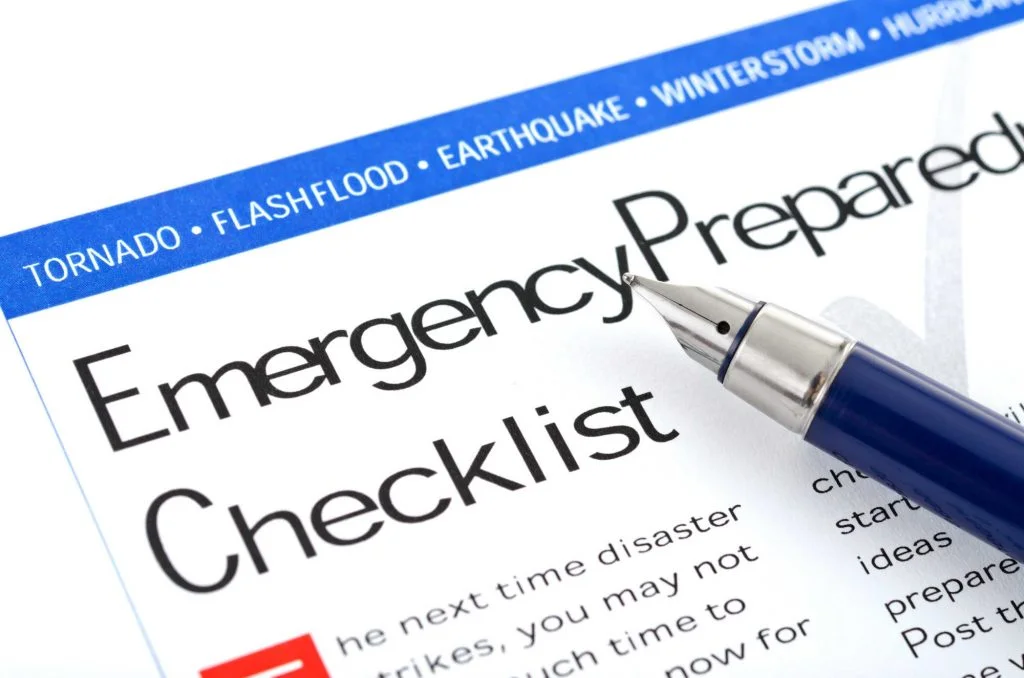There is plenty of useful, actionable advice online about how to respond to disasters and prepare for emergencies. Whether you’re reading books at your local library, exploring our site, or watching one of the many prepper shows out there, there’s a lot to take in.
The issue for newcomers is knowing how to prioritize. What do you need to know? To help out, we’ve put together an emergency preparedness checklist to make sure you at least have all your basics covered if disaster strikes.
Tip #1: Understand Your Needs
This first tip is simple but essential. You must learn the difference between what you need and what you want. To help, we recommend looking at the Maslow’s Hierarchy of Needs model, which goes as follows:
- First, meet your body’s physiological needs (i.e., food, water, air, temperature)
- Second, secure yourself and your belongings against threats both natural and man-made
- Third, find what you need to be emotionally healthy, usually in the form of friends and a good-natured community
- Fourth, monitor your self-esteem, making necessary changes to improve your sense of self-worth
- Finally, move towards self-actualization, bettering, and mastering yourself to bring out your full potential
While all of these things matter on some level, it is those first three a prepper should prioritize (and in the order they are ranked). Without shelf-stable food, water, and shelter you are unsafe.
Without emotional stability, you may eventually crack or otherwise become more vulnerable to panic. In an emergency, mental health may not be more important than physical health, but it is important.
Tip #2: Modern Technology Requires Electricity
Many emergency preppers make one of two mistakes. One group forgets that modern infrastructure could collapse or become temporarily disabled in an emergency. The other understands that infrastructure will collapse but falsely assumes that means basically all modern technology will be unusable.
Like many things, the truth is in the middle. A great deal of our modern technology requires electricity. However, you can buy equipment to generate electricity without the help of your local power company.
Modern science allows you to do a great deal on your own without much outside help. Stockpiling fuel like gasoline and propane can offer a good power source early on. Gasoline may only last a few months in many common storage scenarios, but propane doesn’t go bad if stored right.
Many lists of apocalypse preparedness tips forget that some emergencies could last months or years. If you suspect all of modern civilization might collapse, then you’ll be on your own even longer. That doesn’t mean you need to live in the Stone Age.
Generating electricity also really is not as complicated as some survivalists assume. While the science behind generation is complicated, the practical implementation of that science is easy. You can even build a bicycle-powered generator at home in a few steps.
Tip #3: First Aid Is Your Friend
If you do not know basic first aid, learn it. Learning enough to become a true doctor is difficult and takes years of work. Learning enough to treat most basic field injuries is relatively easy and takes a few weeks of practice.
Do you know how to stop heavy bleeding? What about how to prevent infection? How’s your CPR technique? No list of tips for preppers is complete without touching on the importance of these things.
Preppers guides often focus on the aspects of prepping people think are “fun” or “cool.” Your guns and bunker won’t matter if you don’t even understand the basics of germ theory or how to stop blood loss.
Of course, this information is a lot more helpful if you have a first aid kit around. If you don’t know where to start with building one, the Red Cross has some advice and there are many solid kits that at least have the basics available for under 40 dollars.
Some practice and a good kit allows you to save lives. If you expect any level of violence or accidental injury to occur during an emergency, you’ll need both. Otherwise, even if the injury seems minor, by modern standards, the injured individuals could die.
Tip #4: Safety in Numbers
In a disaster, you’re right to worry about what your neighbors are up to. For some people, the only thing stopping them from doing evil is the fact that government authority is at the ready to stop them.
Others may panic under pressure, getting violent because they are desperate or afraid. They may lash out at people they don’t know well or who they may be prejudiced against.
This all said, an early goal of yours during a “doomsday” scenario, or even a temporary but serious emergency, should have a community preparedness plan. You need people you can trust and rely on if you want to do more than survive.
If twenty people came to the average prepper shelter to do them harm, the people in that shelter are going to lose. Even if the shelter is well-built and the people inside are armed, many preppers assume the 3-4 people in their household are enough and it isn’t, at least not forever.
Building up a group of people you can trust does more than help you repel attackers, too. You gain access to skills and expertise you would likely lack yourself. Imagine the good a plumber or carpenter can do for your group, let alone someone like a doctor or special forces veteran.
Tip #5: Get a Weapon, Learn to Use It
We don’t want to focus on weapons too much because, frankly, humans statistically work together more than many preppers assume. That said, bad apples still exist.
We suggest buying at least a rifle or two for self-defense, along with a few hundred rounds if you’re planning for the long haul. If you don’t have the money or the law makes that difficult in your area, a shotgun or other firearm can also suffice.
Everyone in your house should know how to use it and understand the basics of gun safety. They don’t have to like or want to use a gun but should know how to handle one in an emergency.
It also bears mentioning that a weapon that has reusable ammunition, such as a crossbow, is also a great secondary household weapon for hunting or if you begin to run low on ammunition for your firearms.
An Emergency Preparedness Checklist Is Only the Beginning
We designed this emergency preparedness checklist to cover the basics, but there is plenty more useful advice out there for you to learn. If you’d like to learn some more of the advice we have to offer, explore our blog!
There are also a few local and Federal Government agencies that are specifically designed to keep and maintain the public health due to man made or Natural acts of God. Natural disasters and crises lead to the erosion of infrastructure and services, which in turn hinders recovery and contributes to a state of chaos. Check out these Governmental agencies
Office Emergency Management
With the proliferation of climate change, more and more communities are experiencing destructive events such as earthquakes, hurricanes, floods, and wildfires. It’s not enough to simply rebuild; they need to start with a smarter design that is resilient to the next storm or earthquake.
The OEM guides communities towards progress while cultivating sustainable growth for generations to come. Your Local and State Office of Emergency Management work on both the front-end and backend — mapping out the entire relief process before it happens — so they can successfully keep your business or organization on schedule while minimizing any financial or logistical risk. A practical prepper would be aware of what their State or Country’s plan is during an emergency. Find Your Local Office Of Emergency Management.
Center for Disease Control
It’s hard to stay aware about current health issues with everything happening in the world. We are bombarded with new diseases every year that are being brought into the US.
Many people are getting sick due to new viruses, bacteria, and infections that are being spread around. With rates of new disease on the rise, it’s harder than ever to stay on top of your health. This is why we have to be proactive when it comes to disease control and prevention.
The Center For Disease Control and Prevention (CDC) helps us with this by providing updated information on how to prevent, treat, and respond to these problems. They do this through developing evidence-based guidelines, coordinating public health surveillance systems, solving public health crises, monitoring food safety, increasing access to health care around the world, and promoting healthy behavior. The CDC is world famous and should be a quality resource for Practical Preppers building their awareness of virus and bacterial infections.
Bonus: Pandemic Preparedness
When a new virus appears; it’s able to spread throughout the world very quickly. Most viruses, however, are first detected in one or two countries before spreading all around. The next pandemic could easily arise in any country, but most new viruses are first detected in one or two countries before spreading all around.
What do you if a Pandemic is declared?
- Wash your hands often with soap and water for at least 20 seconds and try not to touch your eyes, nose or mouth.
- Keep a distance of at least six feet between yourself and people who are not part of your household.
- Cover your mouth and nose with a mask when in public.
- Clean and disinfect high-touch objects and surfaces.
- Stay at home as much as possible to prevent the spread of disease.
-Vince


